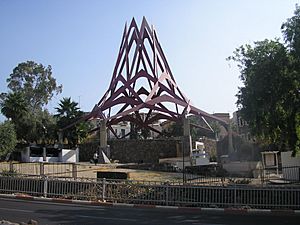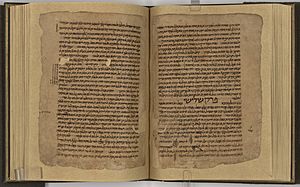Maimonides facts for kids
Quick facts for kids
|
|
|---|---|

An old drawing of Maimonides
|
|
| Born | 30 March or 6 April 1135 Possibly born 28 March or 4 April 1138 |
| Died | 12 December 1204 (66-69 years old) |
|
Notable work
|
|
| Spouse(s) | (1) daughter of Nathaniel Baruch (2) daughter of Mishael Halevi |
| Era | Medieval philosophy
|
| Region | Middle Eastern philosophy
|
| School | Aristotelianism |
|
Main interests
|
Religious law, Halakha |
|
Notable ideas
|
Oath of Maimonides, Maimonides' rule, Golden mean, 13 principles of faith |
|
Influenced
|
|
| Signature | |
Moses ben Maimon (1138–1204), often called Maimonides or Rambam, was a very important Jewish thinker. He was a Sephardic Jewish philosopher and one of the most famous Torah scholars of the Middle Ages. He was also a top astronomer and physician. He even worked as the personal doctor for Saladin, a powerful leader.
Maimonides was born in Córdoba, which is in modern-day Spain. He lived and worked as a rabbi, doctor, and philosopher in Morocco and Egypt. He passed away in Egypt, and his body was later buried in Tiberias, a city in Israel.
During his life, many Jewish people admired Maimonides' writings on Jewish law and ethics. He became the respected head of the Jewish community in Egypt. Even though some people disagreed with his ideas, he is now seen as one of the most important Jewish legal experts and philosophers ever. His huge work, the Mishneh Torah, is still a key book for Jewish law. He was sometimes called "The Great Eagle" because he was so smart and important.
Maimonides was also a big name in Islamic and Arab science. He was influenced by famous thinkers like Aristotle and Ibn Rushd. This made him a leading philosopher and a "polymath" (someone skilled in many different areas) in both the Jewish and Islamic worlds.
Contents
Understanding Maimonides' Name
Maimonides called himself "Moshe son of Rabbi Maimon, the Spaniard" in Hebrew. In modern Hebrew, he is known as Rambam, which is short for "our Rabbi Moshe son of Maimon."
In Arabic, he was often called Mūsā bin Maymūn. In Greek, his name became Moses Maimonides, with "-ides" meaning "son of."
His Life Story
Early Years and Family
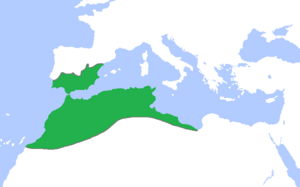
Maimonides was born in 1138 (or 1135) in Córdoba, Andalusia, which was then part of the Muslim-ruled Almoravid Empire. This was near the end of a "golden age" for Jewish culture in Spain. His father, Maimon ben Joseph, was a Jewish judge. His family believed they were direct descendants of King David.
Maimonides learned about the Torah from his father. From a young age, he loved science and philosophy. He read books by Greek philosophers that were translated into Arabic. He also learned a lot from the Islamic culture around him. Maimonides was admired for his personality and his writings. He wrote many of his important works while traveling.
Forced Exile
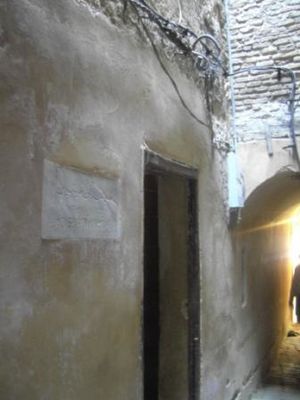
In 1148, a group called the Almohads took over Córdoba. They made it very hard for non-Muslims to live there. Jewish and Christian communities had to choose between converting to Islam, facing death, or leaving. Many Jews were forced to convert, but the authorities were suspicious of fake conversions.
Maimonides' family, like many other Jewish families, chose to leave. For the next ten years, Maimonides moved around southern Spain before settling in Fez, Morocco. During this time, he wrote his famous explanation of the Mishnah.
Later, around 1168, he moved to Palestine and then settled in Fustat, Egypt. In Cairo, he studied in a yeshiva (a Jewish school) that is now named after him. He also visited the Temple Mount in Palestine, which he called a holy day for him and his family.
Maimonides played a key role in helping Jewish people who were captured during a war. He sent letters to Jewish communities asking for money to pay their ransom. The money was collected, and the captives were set free.
A Family Loss
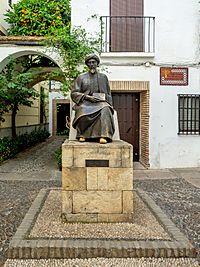
After this success, Maimonides' family invested their money with his younger brother, David, who was a merchant. David traveled to trade goods but sadly drowned at sea sometime between 1169 and 1177. This loss made Maimonides very ill with grief.
Leading the Community
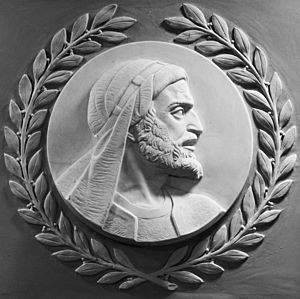
Around 1171, Maimonides became the Nagid, or leader, of the Egyptian Jewish community. He was replaced for a short time but was reappointed in 1195. He was praised as "the light of east and west" for his leadership.
Becoming a Famous Doctor
With the family's money lost, Maimonides became a doctor, which made him very famous. He had studied medicine in both Córdoba and Fez. He became the court physician for Sultan Saladin and later for the Ayyubid dynasty.
In his medical writings, Maimonides described many illnesses like asthma and diabetes. He stressed the importance of a balanced and healthy lifestyle. He knew a lot about Greek and Arabic medicine but always used his own observations and experience. He cared deeply for his patients, showing respect for their choices and cultures.
Maimonides was incredibly busy. He wrote that after visiting the Sultan's palace, he would come home to find his waiting rooms full of people needing help. He would write prescriptions until evening, feeling very tired. Even on Shabbat (the Jewish day of rest), he would see community members. It's amazing that he still managed to write so many important books on medicine, science, Jewish law, and philosophy.
A later Jewish legal expert, Joseph Karo, greatly praised Maimonides. He said that Maimonides was the greatest legal expert, and Jewish communities in many places followed his teachings.
His Passing
Maimonides died on December 12, 1204, in Fustat, Egypt. Many old sources say his body was buried near Lake Tiberias in Israel. Today, his tomb in Tiberias has a famous saying: "From Moses to Moses arose none like Moses," meaning he was as great as the biblical Moses.
Maimonides had one son who lived to be an adult, Abraham Maimonides. Abraham became a great scholar himself and took over his father's roles as Nagid and court physician at just eighteen years old. The Maimonides family continued to hold the position of Nagid for four generations.
A statue of Maimonides stands near the Córdoba Synagogue in Spain.
His Important Works
Mishneh Torah: A Code of Jewish Law
The Mishneh Torah is Maimonides' huge collection of Jewish law. It brings together all the important laws from the Talmud and other early scholars. It's also known as Yad ha-Chazaka or Yad, which means "hand" and has a number value of 14, matching the 14 books in the work.
Later Jewish law books, like the Shulchan Aruch, used the Mishneh Torah a lot. At first, some people didn't like it because Maimonides didn't include all his sources, and they thought he wanted people to stop studying the Talmud. But Maimonides later said that wasn't his goal. Despite the early disagreements, the Mishneh Torah became a very important book for Jewish law.
Maimonides famously wrote: "It is better and more satisfactory to acquit a thousand guilty persons than to put a single innocent one to death." He believed that if you executed someone without being absolutely sure they were guilty, it could lead to unfair trials.
Other Jewish and Philosophy Books
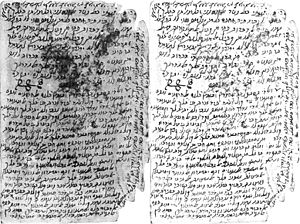
Maimonides wrote many books on Jewish studies, law, philosophy, and medicine. Most of his works were in Judeo-Arabic, which is Arabic written with Hebrew letters. However, the Mishneh Torah was written in Hebrew.
Other key Jewish texts include:
- Commentary on the Mishnah: This was the first full explanation of the entire Mishnah, which took him seven years. It includes important introductions about Jewish law and his famous "thirteen principles of faith."
- Sefer Hamitzvot (The Book of Commandments): In this book, Maimonides lists all 613 commandments found in the Torah.
- Sefer Ha'shamad (Letter of Martyrdom): A letter about staying true to one's faith.
- The Guide for the Perplexed: A philosophical book that tried to connect Aristotle's ideas with Jewish beliefs. It was finished between 1186 and 1190.
- Teshuvot (Collected Letters): His letters and answers to questions, including a famous letter to the Jewish community in Yemen.
Medical Writings
Maimonides' work in medicine was well-known. One of his important medical books is Guide to Good Health, which he wrote for Sultan Saladin's son, who had depression. This book was translated and was one of the first medical books ever printed in Florence in 1477.
Even though some of his medical treatments are old, his ideas about preventing illness, public health, and caring for patients are still important today. He wrote ten medical books in Arabic, which have been translated into English.
The Oath of Maimonides
The Oath of Maimonides is a text about the duties of doctors, sometimes used instead of the Hippocratic Oath. It's important to know that Maimonides might not have written this oath himself; it appeared much later and was linked to him.
Treatise on Logic
Maimonides also wrote a Treatise on Logic. This book explains the basics of Aristotle's logic, as taught by great Islamic philosophers like Al-Farabi. It helps readers understand the technical words used in logic. It's believed he wrote this when he was young.
Maimonides' Philosophy
Through his book The Guide for the Perplexed and his introductions to the Mishnah, Maimonides greatly influenced other philosophers, including Christian thinkers like Thomas Aquinas. He was a "Jewish Scholastic," meaning he tried to combine religious faith with logical reasoning and science. He wanted to show that there was no conflict between God's revealed truths and what humans learned through science and philosophy.
The Thirteen Principles of Faith
In his commentary on the Mishnah, Maimonides listed his "13 principles of faith." These were what he believed were the most important beliefs for Judaism:
- That God exists.
- That God is one and cannot be divided.
- That God is spiritual and has no body.
- That God is eternal (has no beginning or end).
- That only God should be worshipped.
- That God speaks to people through prophets.
- That Moses was the greatest prophet.
- That the entire Torah (Written and Oral Law) came directly from God to Moses at Mount Sinai.
- That the Torah given by Moses will never change.
- That God knows all human actions and thoughts.
- That good deeds are rewarded and bad deeds are punished.
- That the Jewish Messiah will come.
- That the resurrection of the dead will happen.
These principles were debated at first but are now widely accepted by Orthodox Jews. Two prayers based on these principles, Ani Ma'amin and Yigdal, are now part of many Jewish prayer books.
Understanding God
Maimonides believed that to love and fear God, one should study God's creations and marvel at their order and wisdom. This leads to a deep love for God and an understanding of how small we are compared to Him. He thought this was the foundation of the Torah.
He also believed that we should describe God using "negative attributes." Instead of saying "God is wise," we should say "God is not ignorant." This means we describe what God is not, rather than trying to define what God "is."
Maimonides strongly argued that God does not have a body. He said that any phrases in holy texts that describe God with human features should be understood as metaphors. He also believed that many of the commandments in the Torah, especially those about sacrifices, were meant to help the Israelites move away from idolatry (worshipping idols).
Developing Good Character
Maimonides taught a lot about building good moral character. He believed that everyone has a natural personality, but we have free will to choose how we behave. He wrote that we should always act kindly and pleasantly towards others.
He advised people with bad habits to recognize them and then try to act in the opposite way. For example, an arrogant person should practice humility. If it's impossible to behave ethically in one place, he said, one should move somewhere new.
Prophecy and Logic
Maimonides agreed with Aristotle that using logic is the correct way to think. He believed that to understand God, every person must study and meditate to reach a high level of perfection, which could lead to a prophetic state. He thought that prophecy was the highest goal for the most learned people.
The Problem of Evil
Maimonides also wrote about why evil exists if God is all-powerful and good. He said that evil is not something God created, but rather the absence of good. God created good, and where good is missing, evil appears.
He believed there are three types of evil:
- Evil caused by nature (like natural disasters), which he said is rare and necessary for the balance of life.
- Evil that people do to each other, which he said is also rare and caused by humans themselves.
- Evil that people bring upon themselves, which he believed was the most common type. This happens when people give in to their physical desires. To avoid this, people must learn to control their urges.
Doubts about Astrology
Maimonides was asked about astrology (the belief that stars influence human events). He said that people should only believe what can be proven by logic, senses, or trustworthy sources. He had studied astrology and said it was not a real science. He thought it was silly to believe that a person's fate depended on the stars, because that would mean people have no purpose and are just slaves to destiny.
Beliefs: True vs. Necessary
In The Guide for the Perplexed, Maimonides explained the difference between "true beliefs" (which help us understand God) and "necessary beliefs" (which help society function). For example, he said that believing God gets "angry" with wrongdoers is a necessary belief. God doesn't actually have human emotions like anger, but it's important for people to believe this so they avoid doing bad things.
The Future: Messianic Era and Resurrection
Maimonides wrote a lot about the future, including the Messianic era and the resurrection of the dead. He believed that the resurrection would happen at some point, but it wouldn't be permanent. He thought that God doesn't break the laws of nature. So, if people were resurrected, they would eventually die again.
The World to Come
Maimonides described the "World to Come" as a spiritual state after a person's life in this world and after the Messianic Era. In this state, souls would live forever without bodies, enjoying God's presence without needing food or drink. He believed that by gaining true knowledge of God, people could develop a spiritual nature that would lead to this eternal happiness and immortality.
His Impact and Legacy
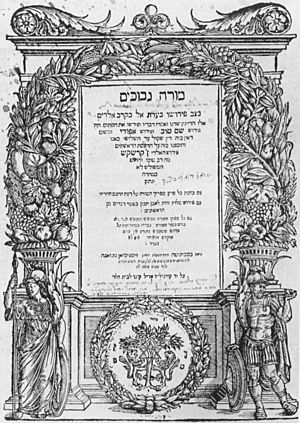
Maimonides' Mishneh Torah is still one of the most important books of Jewish law and ethics today. It is known for its clear structure, concise writing, and deep knowledge. It is still studied closely in Jewish schools.
He was also one of the most influential Jewish philosophers of the Middle Ages. His way of combining Aristotle's ideas with biblical faith greatly influenced later Jewish thinkers. He also impacted Christian theologians like Thomas Aquinas, who mentioned Maimonides in his own works.
Maimonides' skills in theology, philosophy, and medicine make his work still relevant today, especially in discussions about medical ethics.
Maimonides Today
Maimonides is still widely discussed by modern scholars. He is seen as an intellectual hero by many different Jewish movements. His ideas on humility have also been adopted by modern humanist philosophers.
Many medical centers and schools are named after Maimonides, like the Maimonides Medical Center in Brooklyn, New York, and the Rambam Health Care Campus in Haifa, Israel.
In 1986, Maimonides was featured on the 1-shekel bill in Israel. In 2004, conferences were held at universities like Yale and Harvard University to celebrate the 800th anniversary of his death. In 2008, Israel, Morocco, and Spain planned a project to trace Maimonides' footsteps to boost religious tourism.
Burial Place
Maimonides is buried in the HaRambam complex in Tiberias, Israel.
Other important rabbis also buried there include:
- Shelah HaKadosh
- Eliezer ben Hurcanus
- Yohanan ben Zakkai
- Joshua ben Hananiah
Images for kids
See also
 In Spanish: Maimónides para niños
In Spanish: Maimónides para niños


